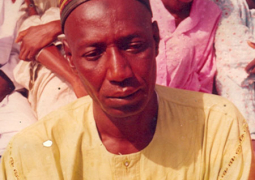"Women in Governance and Decision-making Positions" is an issue worth presenting on as a key paper to be presented to the National Assembly Members, local governance authorities, civil society organisations and traditional rulers at the grass-roots level, since there are indications that it is an issue of concern, and that all is not well. This was declared by Mrs Elizabeth F.Y Renner, on 27th October 2010, at the Paradise Suites Hotel.
She was speaking at the Regional Outreach Forum for National Assembly Members in her capacity as the Speaker of the National Assembly, less than ten days before she was removed from the post.
According to Mrs Renner, 'the problem is not whether there is female participation in the governance of this country, and whether women do take part in decision making'. Rather, the question is: Are women truly represented in these areas?
Renner was making a powerpoint presentation, during the second Regional Outreach Forum for National Assembly Members.
Participants at the forum also wanted to know certain facts from her, and they asked the following questions: What is the percentage of women in such positions? What type of decisions do they make? How much independence do they have in making decisions, and in controlling the positions they occupy? How effective are the decisions they make? Do these decisions really achieve the desired results? These questions generated a lot of discussion from the floor.
Renner further asked: 'It is true that just about two decades ago these sorts of questions would not even have been asked, because it was the national acceptance, if not a universal one in the African continent, that the world was male, and women were meant to play second fiddle to men.
Men were the leaders, they had the power, they were more educated and, therefore, wrongly or rightly, considered the more intelligent. Such adage like: 'A woman's place is in the home;' 'girls are to smile and courtesy and not to be heard'; 'the husband is the breadwinner and the women the caretaker of the house', were received by both males and females as the natural order of society, a natural phenomena ordained by God himself when he first created Adam out of nothing and then decided to create Eve from a rib of Adam.
Mrs Renner further stated: 'What more proof does one need to believe that women are inferior to men, and that the whole existence of women is to support and serve man, her master to whom she owed her very existence?
'Behind every successful man there is a woman,' is interpreted to mean that there is a woman to support the man in what he is doing, by making sure he is properly fed and well clothed, and to ensure that he has a warm comfortable bed to fall back into, when he comes home from work or wherever."
"The real meaning of the saying is always ignored. The fact that it is the woman who is the real brain behind the man’s success, that it is the woman whose ideas are being put forward as the man's, that it is the woman who does the lobbying, that it is the woman who monitors, evaluates and restructures the strategies to the man's success are all hidden under a bushel.
"The truth is that the man far from being ungrateful to his wife is very appreciative of what she is doing as long as she continues being the shadow, and he remains the substance; thus the man is proud to acknowledge his wife as his wife, but not as the brain behind his success. After all, who are those identified as the vulnerable in society? Women and children! Not Children. Not women. But women and children!
"What does this tell us? Simply, that those women have been classified as children. That is why most of the management development policies in the
She said that, even if the women do have a mind, it was an empty shell which had to be filled by adults’ thoughts and views, and that if women were like children, how can a man ever acknowledge that he owes his success/his position, the power and the respect he has in society to a woman?
It is for this reason, she added, that women have continued to hold a background position, and remain a shadow to men.
But men also know that they cannot survive without women, for it is only a dead man, a ghost that does not have a shadow. So without their shadow, without women, men are dead, she continued.
"At village level, the council of elders have always been men, and so have been the chiefs and alkalos, and the status of women was relegated to being responsible for the reproductive process, while been denied the thought and means to control it.
"Even the coming of the white man confirmed that leadership was men's domain, and never in the history of The Gambia was there a woman commissioner or a woman governor. Women were the ones who lined the streets and clapped and waved to welcome the dignified man or sang and danced to entertain him.
"Yet women's world is not all as black as it is usually painted. In the outside world, especially in countries were a great number of women had achieved education for a long time, women have fought for their right to be considered not only to be at par with men, but as a force to be reckoned with," she said.
As a result, the former Speaker continued, we have groups like the Women Caucus in
She added that the world has seen such dynamic women leaders like Indira Gandhi of
"Recently history was made when it was possible to hold the 6th Conference of Women's Speakers with an attendance recorded as unprecedented, and this shows a vast increase in women Speakers in terms of numbers. But, this though, did not mean a lot in terms of percentage of the whole, that is, the percentage of women Speakers in the world."
"Recently, and closer at home, we have Ellen Johnson Sirleaf of
"The concept of quality of sexes should be promoted without disturbing the existing patriarchal basis of the social system, which should be maintained in order to serve the fabric of society and ensure stability of family life."
Since then, however, the status of women in The
"In our foreign missions also, we have women as head of mission or as deputy head of mission. In spite of this stride, however, women still lack control over issues affecting them, and are unable to bring about significant changes in the social system, which today, in the new millennium, continues to boast of the same patriarchal basis.
According to Mrs Renner, members of the National Assembly have a significant role to play in this, especially since, at present, the composition of the National Assembly is male-dominated. "We await 2011 to see what will happens," she added.



